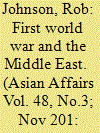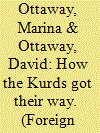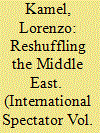|
|
|
Sort Order |
|
|
|
Items / Page
|
|
|
|
|
|
|
| Srl | Item |
| 1 |
ID:
155115


|
|
|
|
|
| Summary/Abstract |
The First World War in the Middle East swept away five hundred years of Ottoman dominion. It ushered in new ideologies and radicalized old ones – from Arab nationalism and revolutionary socialism to impassioned forms of atavistic Islamism. It created heroic icons, like the enigmatic Lawrence or the modernizing Atatürk, and it completely re-drew the map of the region, forging a host of new nation states, For many, the self-serving intervention of these powers in the region between 1914 and 1919 is the major reason for the conflicts that have raged there on and off ever since. Yet many of the most common assertions about the First World War in the Middle East and its aftermath are devoid of context. This article argues that, far from being a mere sideshow to the war in Europe, the Middle Eastern conflict was in fact the centre of gravity in a war for imperial interests. Moreover, contrary to another persistent myth of the First World War in the Middle East, local leaders and their forces were not simply the puppets of the Great Powers. The way in which these local forces embraced, resisted, succumbed to, disrupted, or on occasion overturned the plans of the imperialist powers for their own interests in fact played an important role in shaping the immediate aftermath of the conflict – and in laying the foundations for the troubled Middle East.
|
|
|
|
|
|
|
|
|
|
|
|
|
|
|
|
| 2 |
ID:
130475


|
|
|
|
|
| Publication |
2014.
|
| Summary/Abstract |
The surge of ethnic and sectarian strife in Syria and across the Middle East has led a number of analysts to predict the coming breakup of many Arab states. This potential upending of the region's territorial order has come to be known as "the end of Sykes-Picot," a reference to the secret 1916 Anglo-French agreement to divide up the Middle Eastern provinces of the Ottoman Empire into British and French zones of control. Because the European treaties that created new Arab states in the aftermath of World War I upheld the outlines of that agreement, Sykes-Picot became the convenient shorthand for the map that colonial powers imposed on the region, one that has remained essentially constant to the present day.
With bloodshed from Aleppo to Baghdad to Beirut, it is indeed tempting to predict the violent demise of Sykes-Picot. But although the worst fighting is spilling over borders and pushing some countries, such as Syria, toward fragmentation, there is another force crossing national lines and even realigning national relationships: trade. New transnational zones of economic cooperation are making Middle Eastern borders more porous, but in a way that does not directly challenge existing states. Instead, mutual economic interests, especially in the oil and gas industries, may signal a softer end to Sykes-Picot.
|
|
|
|
|
|
|
|
|
|
|
|
|
|
|
|
| 3 |
ID:
147937


|
|
|
|
|
| Summary/Abstract |
The Middle East is experiencing one of the darkest periods in its history and a new regional order is still far from being established. Yet, it appears increasingly clear that few matters will affect its developments more than the ongoing regional demographic dynamics. The region’s history and spatial background provide a framework for approaching these epochal shifts and critically examining the ‘ethnic stabilisation’ thesis, which interprets current demographic movements as a kind of normalisation of the region’s ‘original’ demographics. Instead of this ‘medievalization of the Middle East’, many people in the region are keen on ‘getting back into history’ and ‘regaining possession’ of their multifaceted past: a powerful antidote to the geopolitical reductionism so popular nowadays.
|
|
|
|
|
|
|
|
|
|
|
|
|
|
|
|
|
|
|
|
|